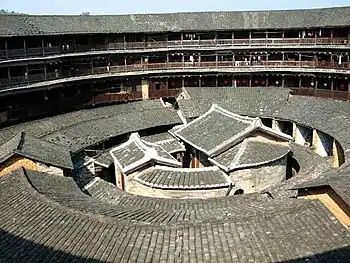တရုတ်ယဉ်ကျေးမှု
Hakka culture (တရုတ်: 客家文化) refers to the culture created by Hakka people, a Han Chinese Subgroup| ဟန်တရုတ်အုပ်စု, across Asia. It encompasses the shared language, various art forms, food culture, folklore, and traditional customs. Hakka culture stemmed from the culture of Ancient Han Chinese, who migrated from တရုတ်ပြည် အလယ်ပိုင်းလွင်ပြင် to what is modern day's တရုတ်ပြည် တောင်ပိုင်း during the 6th to 13th century, and intermixed with local non-Han ethnic groups such as the Miao people|မြောင်.[1] It has also been influenced by the cultures of surrounding Han Chinese groups, such as the Cantonese| လက်တို and the Hoklo| လက်ရှည်. Having historically lived in the mountains of Southern China and being minority groups in many of the surrounding Chinese provinces, Hakka have developed a culture characterized by reservedness, stability, and frugality.[2][3]
| Wikimedia Commons တွင် Hakka culture နှင့် ပတ်သက်သော မီဒီယာ ရှိသည်။ |
- 客家文化源于河洛文化
- Jian-xin, Z. H. O. U. (2005). Ethnic Identity, Culture Consciousness and Hakka Culture [J]. Journal of Guangxi University For Nationalities (Philosophy and Social Science Edition), 2.
- Deng-qiu, C. A. I. (2004). On Pluralism of the Formation of the Hakka Culture [J]. Journal of Sanming College, 3, 015.

